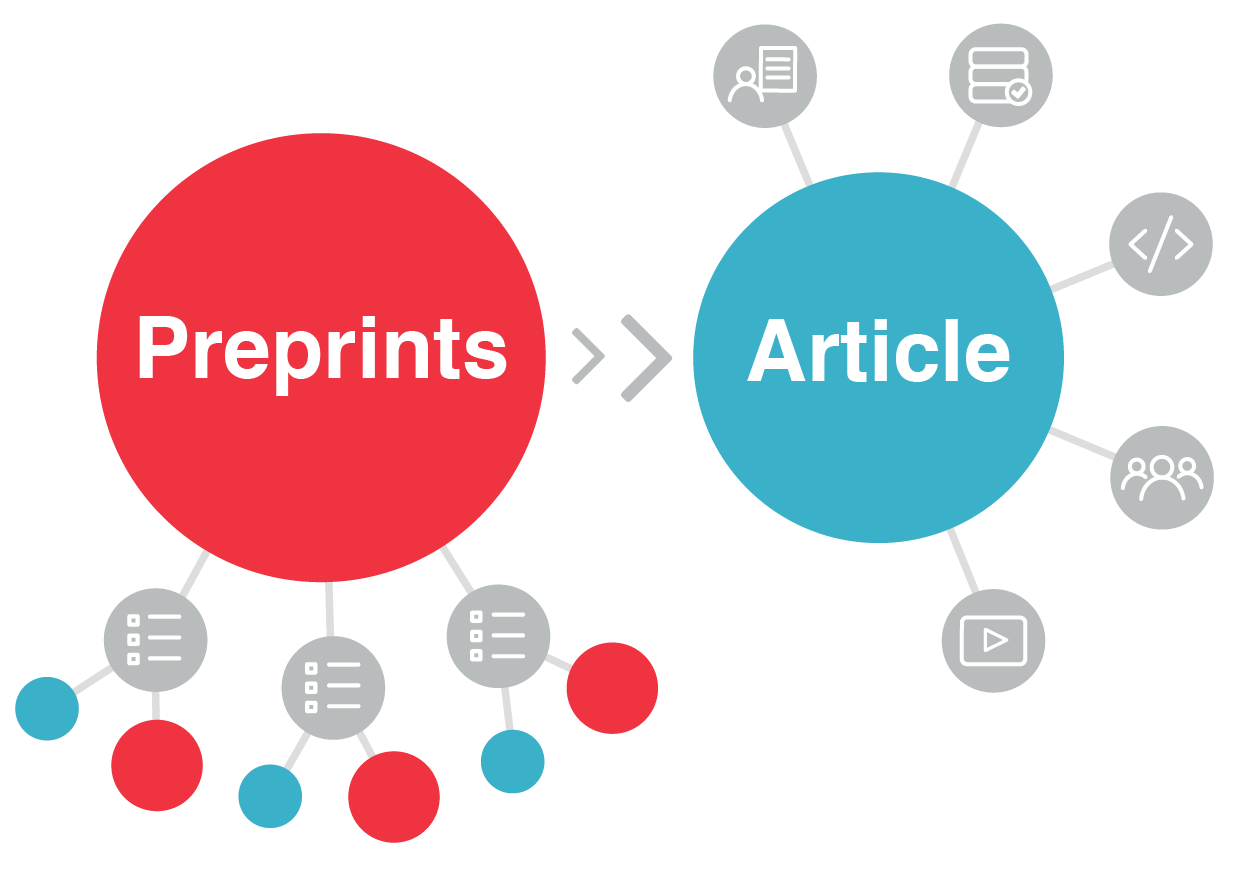Our members asked for the flexibility to register content at different points in the publishing lifecycle, so we extended our infrastructure to support members who want to register early versions such as preprints or working papers.
Our custom support for preprints ensures that links to these outputs persist over time, that they are connected to the full history of the shared research results, and that the citation record is clear and up-to-date.
Publishing preprints is about more than simply getting a DOI
Crossref can help you to clearly label content as a preprint using a preprint-specific schema. It’s not advisable to register preprints as data, components, articles, or anything else, because a preprint is not any of those things. Our service allows you to ensure the relationships between preprints and any eventual article are asserted in the metadata, and accurately readable by both humans and machines.
We have designed a schema together with a working group that included preprint advisors from bioRxiv and arXiv, along with members including PLOS, Elsevier, AIP, IOP, ACM. The schema lays out what metadata is specifically important for preprint content. We also developed a notification feature to alert preprint creators of any matches with journal articles, so they can link to future versions from the preprint.
Since November 2016, members have been registering hundreds of thousands of preprints with us, and thousands of those in turn already have matches with journal articles too (requires a JSON viewer). These relationships in the Crossref metadata, available through our APIs, are relied upon by many parties - from researchers to funders - to discover, track and evaluate the preprint journey.
Benefits of our custom support for preprints
- Persistent identifiers for preprints to ensure successful links to the scholarly record over the course of time
- The preprint-specific metadata we ask for reflects researcher workflows from preprint to formal publication
- Support for preprint versioning by providing relationships between metadata for different iterations of the same document.
- Notification of links between preprints and formal publications that may follow (such as journal articles, monographs)
- Reference linking for preprints, connecting up the scholarly record to associated literature
- Auto-update of ORCID records to ensure that preprint contributors are acknowledged for their work
- Preprints include funding data so people can report research contributions based on funder and grant identification
- Discoverability: we make the metadata available for machine and human access, across multiple interfaces (including our REST API, OAI-PMH, and Metadata Search.

What to be aware of when registering preprints
Members registering preprints need to make sure they:
- Register content using the posted content metadata schema (see examples in the posted content markup guide)
- Respond to our match notifications that an accepted manuscript (AM) or version of record (VOR) has been registered, and link to that within seven days. You should designate a specific contact with us who will receive these alerts (it can be your existing technical contact)
- Clearly label the manuscript as a preprint, above the fold on the preprint landing page, and ensure that any link to the AAM or VOR is also prominently displayed above the fold.
Other considerations:
- References will be flagged as belonging to a preprint in our Cited-by service
- The preprint is treated as one item only without components for its constituent parts
- Each version should be assigned a new DOI, and associate the versions via a relationship with type isVersionOf - learn more about relationships
- Preprints are not currently able to participate in Crossmark.
Registering preprints: joining as a member
Preprint owners who would like to use our preprint service should apply to join as a member. We have a dedicated fee structure for registering each preprint, and volume discounts offered for both backfile and current content. Learn more about our fees.
Registering preprints: existing members
Are you an existing Crossref member who wants to assign preprint DOIs? Let’s talk about getting started or migrating any existing mis-labelled content over to the dedicated preprint deposit schema. You can also give us a specific contact who will receive match notifications that an author’s accepted manuscript or version of record (AAM or VOR) has been registered. Get in touch with our membership team and they’ll be able to walk you through the process.
Learn more about registering preprints in our Education documentation.





